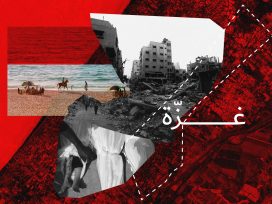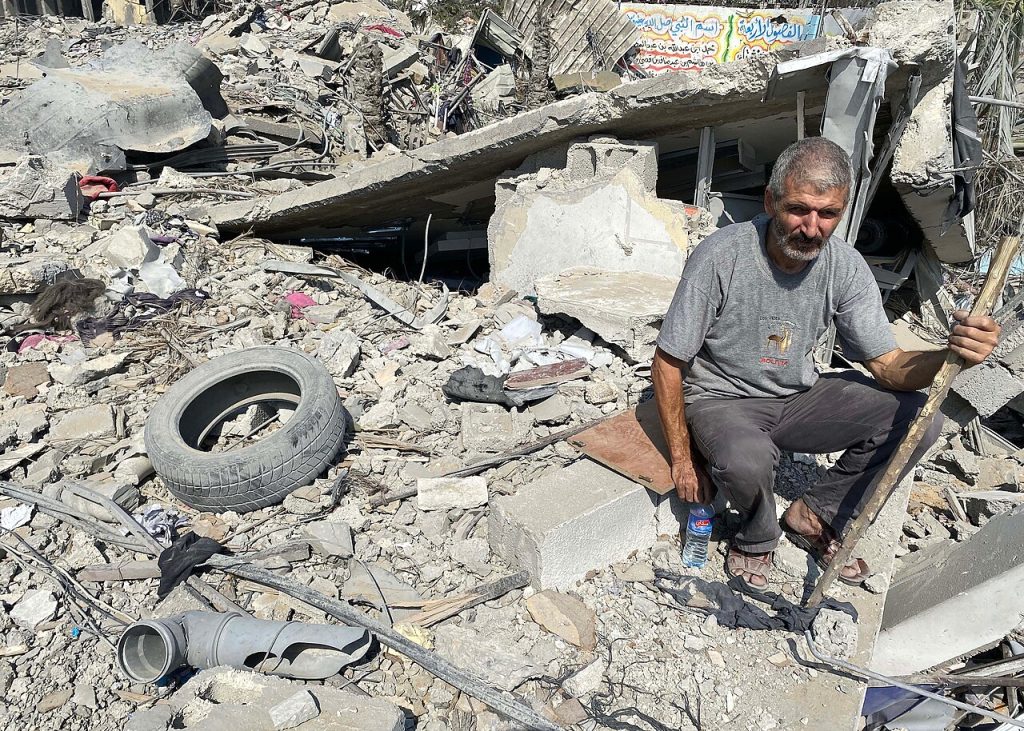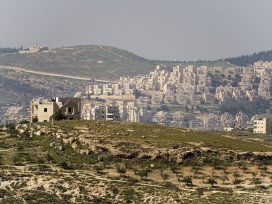
Israel has imposed different forms of settler colonialism across the map of historic Palestine, but nothing can be taken for granted. The refugee camp is itself a spatialization of a political demand, a space of waiting for an eventual return.
Israel’s devastating response to the Hamas attacks is based on the untenable belief that military supremacy translates into strategic advantage, and that security can only be delivered by permanently suppressing the Palestinians.
The Bible has much to say about the fatal significance of shifting military alliances in the small strip of land between the Mediterranean and the Jordan River. Throughout biblical history, all the societies built on it were characterised by their need to ally themselves with one or other of the far larger, more powerful and often competing civilisations they were positioned between.
The prophets who saw how none of these alliances could prevent recurrent conquest came up with the ground-breaking idea of a society based on the justice of the weak against the power of the strong. Or, to use contemporary terminology, soft power against hard.
‘Woe to those who go down to Egypt for help! They rely on horses, trusting in the number of chariots and the great multitude of chariot fighters,’ Isaiah warned the kings of Jerusalem. Instead: ‘By right shall Zion be saved, by righteousness those who dwell therein.’
In a sense, Isaiah’s prophecy came true. What remained when one biblical kingdom after the other had been destroyed was a people – Israel, if you will. In the ‘dispossession’ or ‘diaspora’, the Israeli people could exist and develop an occasionally flourishing Jewish culture without relying on chariots and chariot fighters. Even at the time of the destruction of the Second Temple, more Jews were living elsewhere than on the small strip of land between the sea and the river.

Palestinians inspect the damage following an Israeli airstrike on the El-Remal aera in Gaza City on October 9, 2023. Photo by Naaman Omar apaimages Source: Wikimedia Commons
Throughout biblical history, hard power was never Israel’s best weapon. It still is not in the history being written today.
For a long time now, Israel’s military superiority has not translated into strategic advantages. Ever since the ill-fated invasion of Lebanon in 1982 (resulting in the massacre of the Palestinian refugee camps of Sabra and Shatila), Israel’s wars have cost more than they have yielded. The war in Lebanon in the summer of 2006 did not destroy Hezbollah as intended, but strengthened it. The war in Gaza six months later did not destroy Hamas as intended, but strengthened it. Ever since, each new war to wipe out Hamas (2008, 2012, 2014) –‘mowing the lawn’ as it has come to be called – has only strengthened it.
The current war, which is supposed to wipe out Hamas ‘once and for all’, will not wipe out anything ‘once and for all’. Least of all the fact that Israel lies where it does, on a narrow strip of land between the sea and the river, and is still surrounded by larger and potentially more powerful empires. Nor the fact that, however well-armed and fortified, Israel in its present incarnation relies for its survival on alliances with greater powers – since 1967 with the United States.
Embroiled in yet another war with no discernible end and no sustainable goal, a war that brings more death and destruction in its wake than ever before, it should by now be clear to Israel that no number of chariots will secure its existence ‘once and for all’. With yet another geopolitical earthquake in the making, Israel should see that it must make another attempt – albeit belated – at the kind of power that Isaiah advocated: an attempt to bring about peace and reconciliation between the two peoples on that narrow strip of land, based on justice and righteousness.
The 1993 Oslo Agreement between Israel and the PLO was one such attempt. For a brief moment it seemed that the high-level handshake between Yitzhak Rabin and Yasser Arafat would be followed by thousands upon thousands of handshakes on the ground, leading to a mutually agreed division of the land into two states living peacefully side by side.
I tend to believe that it was the Palestinian uprising of 1987 and Saddam Hussein’s missiles over Tel Aviv in 1991 that caused Yitzhak Rabin, a former Commander-in-Chief and military hardliner, to become aware of the strategic limitations of Israel’s military superiority. Rabin came see peace and reconciliation with the Palestinians as a strategic necessity. But he was assassinated by his own people, and strategic necessity gave way to another period of strategic hubris, and an increasingly aggressive occupation and settlement policy. One people continued to rule over the other militarily and, by creating ‘facts on the ground’, one state continued to colonise the territorial foundations of what could have been the other.
In the decades that followed, Israel told itself that the strategic problem had been solved, that the state on that small strip of land could go on living forever as an occupying power and a de facto apartheid state. The Palestinians, it believed, were too weak and divided to assert their cause, while its own military superiority was sufficient to suppress any revolt and deter any regional enemy. In recent years, Israel even began to think that by forging alliances with autocratic rulers in the Arab world, it could consign the Palestinian cause to the dustbin of history.
For too long, Israel has lived in strategic self-denial. This became all-too evident on the morning of 7 October 2023, when Hamas, with its breach of the ‘secure’ border between Gaza and Israel and pogrom-like massacre of some 1200 unsuspecting Israeli men, women and children, delivered a perfect stab to the heart of the State of Israel – and of the Jews of the world. Not just was this one of the deadliest pogroms in living Jewish memory (the Holocaust aside), but a massacre on Jews perpetrated in the very state that had historically justified its existence, and its policies, by being a haven for Jews.
If Hamas’s intention was to awaken the historical demons of the Jewish world and provoke Israel into a military response of such proportions that it would trigger a geopolitical earthquake, this is exactly what its attacks on 7 October have achieved. If Hamas was hoping to unleash a devastating regional conflagration that would irrevocably end the possibility of peace and reconciliation between the peoples between the sea and the river, this is exactly what it has done.
Israel’s goal of eradicating Hamas ‘once and for all’ with a devastating military campaign is, of course, just as illusory as Hamas’s goal of launching the ‘liberation’ of Palestine ‘from the river to the sea’ with a terrifying terrorist attack. Nevertheless, illusions can have real and terrible consequences. No matter how the war ends (this time), Israel’s existential vulnerabilities and strategic weaknesses have been exposed as never before. Hamas, for its part, has managed to provoke another catastrophe, another Nakba, on its own people, with the intention of detonating the last remnants of the admittedly overgrown road to peace and reconciliation.
In that sense, Hamas has already won. Israel, with its disproportionate and humanly disastrous response, has continued to act on the morally and geopolitically unsustainable strategy that the Palestinians must be forever suppressed – and, if necessary, expelled from their land.
Not just the moral but also the geopolitical unsustainability of a strategy based on military superiority alone has been evident for a long time now. What Isaiah once warned about, and what Yitzhak Rabin tried to draw political conclusions from, should have been clear, if not before, then ever since Israel’s military protector, the United States demonstrated (in Afghanistan and Iraq) its inability to project power in the region by military means. There is very little evidence today that this has changed. Instead, there are many indications that the US is heading for a period of internal uncertainty and external unreliability.
Regardless of how much of Hamas is wiped out this time, of how much of Gaza is razed to the ground, and of how many thousands of Palestinians are killed or driven from their homes, Hamas’s horrific attack marks the end of an Israeli security doctrine built on political-military hubris and strategic self-deception.
Ein brira, no choice, is a Hebrew expression associated with the foundational myth that Israel never had an alternative, that the forces of history and the conditions of geopolitics confronted the young state with only one path to take.
This is not true of course. In the history of Israel there have been many choices not made and many paths not taken. Where they might have led we do not know. But we do know that the paths taken have brought Israel to a dead end. Its geopolitical vulnerability has steadily increased, its ability to deliver security through military supremacy has steadily decreased, and the fragile conditions for peace and reconciliation between the peoples living on the land between the sea and the river have been steadily eroded.
Isaiah’s most beautiful prophecy now sounds more utopian than ever:
For out of Zion shall the Law be proclaimed,
from Jerusalem the word of the Lord.
He shall judge between the nations,
administer justice among all peoples.
They will forge their swords into ploughshares,
and their spears into vineyard knives.
Nation shall not lift up sword against nation,
neither shall they learn war anymore.
Published 15 November 2023
Original in Swedish
First published by Expressen (Swedish) / Weekendavisen (Danish) / Klassekampen (Norwegian) / Eurozine (English)
© Göran Rosenberg / Eurozine
PDF/PRINTSubscribe to know what’s worth thinking about.

Israel has imposed different forms of settler colonialism across the map of historic Palestine, but nothing can be taken for granted. The refugee camp is itself a spatialization of a political demand, a space of waiting for an eventual return.

The two-state solution is often seen as empty talk. But it is the only alternative that offers a realistic prospect of peace in Israel-Palestine and the wider region. Putting it into practice will require not only genuine, detailed discussion, but above all a fundamental shift of mindset.